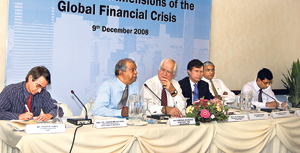
Pannel discussion |
|
An estimated US$1 trillion is lost every year through corruption but Transparency International (TI) founder Peter Eigen said the fallout from this corruption which includes the destruction of the environment, climate change and human rights violations has a much greater cost. TI believes the current global financial crisis illustrates deficiencies in economic and financial governance, manifest in the lack of regulation, transparency, accountability and oversight. Dr. Eigen said a new paradigm of governance is needed to avoid these types of situations and advocated a shared responsibility solution which involves coalition building between governments, the private sector and civil society. Speaking at a round table discussion in Colombo on Tuesday on the governance dimensions of the global financial crisis which also coincided with UN anti-corruption day, Dr. Eigen said TI partners sometimes participate with ulterior motives but this is the price TI has to pay.
For example, the company Siemens, a powerhouse in electronics and electrical engineering which was involved in a colossal financial scandal, worked with TI and helped introduce reforms. Dr. Eigen noted that the same reforms and legislation they introduced on anti-corruption were the very ones the company was subjected to when their malfeasance became public. He said it is shameful that rich countries allow companies to bribe in the international marketplace. He added that every company in Germany relies on bribery to a certain extent. Dr. Eigen said civil society organizations can be equally as corrupt and they too need to strengthen their governance. He said real concrete coalition building is taking place in Sri Lanka between the private sector, government and civil society. He said corruption is as widespread in rich countries as they are in poor nations. He said Sri Lanka was one of the first countries in the Asia Pacific region to ratify the UN anti-corruption convention whereas Germany has still not. In some countries, bribery has become the norm and is viewed as a necessary evil, even in Germany where countries and the media thought it was realistic to accept bribery. Dr. Eigen said most multinational corporations operate without supervision and regulation so corruption has grown due to a lack of effective and coherent governance.

Winners of National Integrity Awards |
|
He said TI is building strategic partnerships with many institutions in a pragmatic approach. US Ambassador Robert Blake said corruption is not unique to any country or company but that US federal employees are encouraged to report corruption and are protected from retribution under whistle-blower laws. He said the global response on the financial crisis has been widespread given the constraints on credit and the slumping asset values. The US is officially in a recession, an announcement which came from the President of the United States himself. Mr. Blake pointed out that interconnectivity of the global economies is a significant problem in that one economy can have a snow-ball effect on others.
Mr. Blake added that concerted international action was needed which is why the central banks of the US, EU, Canada, UK and Switzerland agreed to jointly cut interest rates. In fact, leaders of the G20 at a recent summit held in the US, put out a 47- point plan of action on how to combat the crisis.
They recognized the important role the G20 plays in pro-growth and pro-investment policies. They decided on improving regulatory regimes for markets, reforming international financial institutions for emerging markets, implementing free market principles, rejecting protectionism and expressing a commitment to address the needs of the poorest countries. He said government intervention was and is essential although a middle ground will have to be found in terms of regulation.
Sri Lanka should expect a foreign exchange crunch as banks are not in any position to lend, according to the Minister of Enterprise Development and Investment Promotion Dr. Sarath Amunugama. He said no money is flowing in from the developed world to the developing world due to the global financial crisis. He said the downturn in financial systems has been largely a crisis of confidence due to the lack of regulations and supervisory institutions, especially in the US which will have an impact on Sri Lankan exports of garments, tea and other products. It will be hard to find markets and sustain prices. Dr. Amunugama also said all countries have to accept the necessity for fiscal stimulus where in which governments have to take greater interest and infuse capital. Dr. Amunugama added that Sri Lanka's aid architecture is fast changing from the World Bank, International Monetary Fund, Asian Development Bank, US and Europe being the major ones prior to the tsunami.
Today, Sri Lanka has doubled its assistance to US$1.6 billion in project aid from countries such as Iran, China, India, Hungary and Austria. However, the most amount of corruption and competition takes place with bilateral aid since there is a great deal of collusion amongst the bidders and also the local agents. Dr. Amunugama said the local media is flooded with stories on corruption with documentary proof ranging from contracts to bank transactions and more. However, he said this information was most likely provided by the losing agent who is probably in fear of losing his job and needs to find an explanation, thereby attesting to widespread corruption.
However, Dr. Amunugama said there should be comprehensive investigations on how aid flows and the inbuilt structures which impinge on decisions. Chairman of Finlay PLC Kumar Jayasuriya said the government should be bold enough to loosen its controls on some state institutions and reverse its decision not to privatize. He also said the liquidity in banks has dried up and that the banking system in Sri Lanka is under severe distress. He added that Sri Lanka also has an overvalued currency which is hitting exporters. The currencies of the EU and UK, who are two of the main export destinations for local goods, are devalued. Sri Lankan exporters also have to contend with inflation here which went up as high as 30% a few months ago. |


